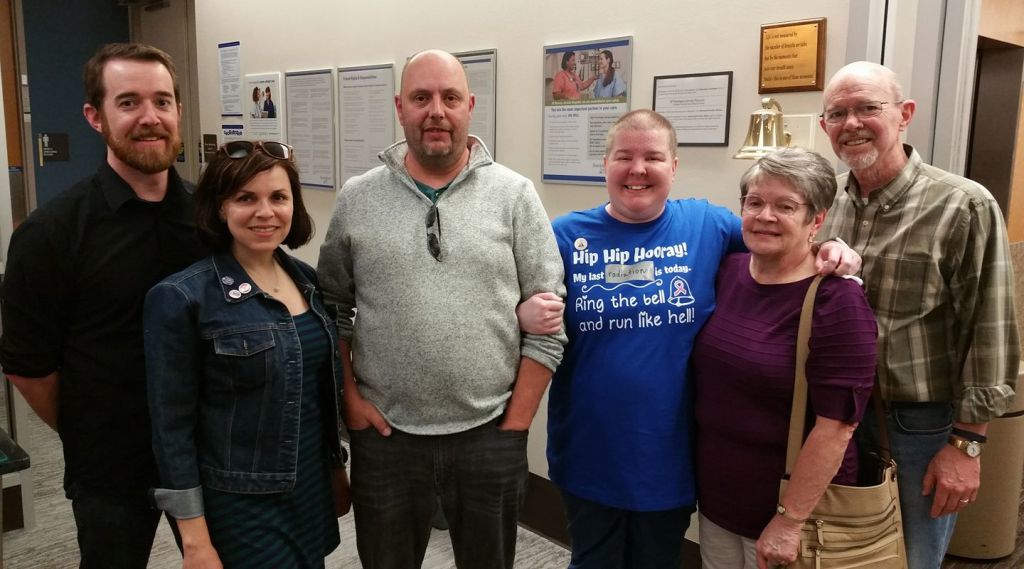Emily Suess lives with an inoperable brain tumor that was finally detected in February 2017, after she had been mistakenly diagnosed with fibromyalgia and depression by a rheumatologist in 2014.
When Suess tries to sleep, it sometimes feels like an elephant is “sitting on her chest,” and she hears a “constant, pulsing rage-whoosh in her right ear.” She has chronic pain, neuropathy, migraines, fatigue, and balance and coordination issues that she has to live with no remedy or relief. She can’t recall what she ate for breakfast yesterday morning because her “short-term memory is shit.”
Suess doesn’t know how long she has to live after undergoing initial brain surgery for a biopsy and then chemotherapy and radiation, which did shrink the tumor but unfortunately did not reverse the symptoms. Suess is no longer receiving treatment because her tumor is deemed inoperable due to its location and because it is diffuse, meaning it doesn’t have clearly defined edges.
To make matters worse, Suess recently found out that after nearly two years, her long-term disability insurance coverage, which pays for everything from her mortgage to her food because she is unable to work, was being canceled. It was a plan she bought while employed as a technical writer for Wolfram Research in Urbana, Illinois, through Lincoln Financial Group, headquartered in Radnor, Penn., which was supposed to cover her in case she ever became disabled.
Unfortunately, Suess is not alone. It is not uncommon for people with chronic disabilities and illnesses to have to wage strenuous battles to try to maintain their long-term disability coverage (different from health insurance) while also fighting their diseases and/or struggling to overcome serious injuries.
For instance, another woman had her policy cancelled by Aetna, despite the fact that she was completely disabled and unable to work. But Suess’s main concern is about the ethics of doctors being paid by the insurance industry to make assessments from afar about patients that they have never seen.
After receiving notice that her policy was being canceled, Suess filed an appeal, a process during which two unfamiliar doctors reviewed her case. One of those doctors was Lee Hartner, an oncologist with Penn Medicine, who has never met Suess.
“Dr. Hartner is not my personal physician,” Suess wrote via email to PW, since she noted talking on the phone is very difficult for her.
“Contrary to direct statements from my actual physician, [Hartner] claimed I was able to work and also said I was in ‘remission,’” Suess wrote. “None of my doctors have ever said I am in remission. My tumor is inoperable. I’ve had treatment, but more treatment is not recommended, and the tumor is still there.”
“Penn Medicine faculty physicians, like those at most academic medical centers, are entitled to do limited outside or extramural work, for which they contract independently and disclose in accordance with our institution’s conflict of interest policies,” Patrick Norton, Penn Medicine’s vice president for public affairs, wrote in an emailed statement to PW. “Penn Medicine is not familiar with the details of Dr. Hartner’s extramural work or the medical opinions he expressed and is unable to comment on this matter.”
Lincoln Financial issued an official statement, saying that the company “does not comment on ongoing claims. We are committed to providing a full and fair review of all claims, in accordance with the terms and conditions of a claimant’s policy. All claimants have a right to file an appeal if he or she disagrees with our determination.”
Lincoln Financial also noted that the long-term disability policy at issue provides for two appeals if a claimant doesn’t agree with the decision. Suess is currently awaiting the response to her second appeal and has considered hiring a lawyer, though the cost is prohibitive at this point.
Lincoln Financial also wrote in an email that their “appeal process is designed to ensure a full and accurate review of all aspects of each individual case” and that a “claimant is able to submit additional information,” which Suess has spent hours doing.
“While we will not discuss the specifics of this matter with you, we can say we have reached out to the claimant to ensure she understands the appeals process,” Lincoln Financial emailed in their official statement on the matter.
“It is amusing to me that they talk about aspects of my appeal rights like they’re some benevolent gift and not, you know, THE LAW,” Suess emailed after reading Lincoln Financial’s response to questions about her case.
Suess is angry and, in addition to filing all the supplementary materials to prove her disability, she has written open letters to the doctors who have reviewed her case without ever meeting her.
“You’ve never met me,” Suess wrote on her blog in an open letter to the first doctor who reviewed her case for Lincoln Financial. “We’ve never exchanged emails, Skyped, talked on the phone or been in close enough proximity that I could throw a used tampon at you. (Okay, full disclosure, I couldn’t throw a used tampon at you anyway because chemotherapy forced me into early menopause and dried up my uterus. I haven’t had a period in well over a year now. But you’d know that if you’d ever interviewed me or completed a full physical examination.)”
In her open letter to Dr. Hartner, Suess cites several lawsuits in which a long-term insurer was cited as the defendant and Hartner as the expert reviewer, including a 2011 court filing where a leukemia patient sued Hartford Life and Accident Insurance Company, a 2010 case in which a patient with Multicentric Castleman Disease sued Coventry Healthcare of Nebraska, and a 2016 case where MetLife retained Hartner as an “Independent Physician Consultant” in a case against Babcock & Wilcox Technical Services, LLC Long Term Disability Plan.
“This is about doctors teaming up and directly harming disabled patients,” Suess wrote in an email. “I think Penn Medicine ought to be proactively protecting patients everywhere from this kind of predatory moonlighting if they want to maintain the public’s trust in their doctors specifically and the organization generally.”
TWITTER: @CHARRISBOND





